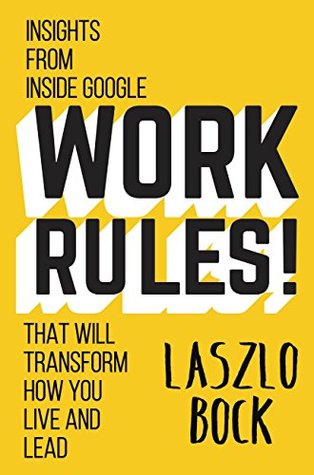More on this book
Community
Kindle Notes & Highlights
by
Laszlo Bock
Read between
October 8 - October 18, 2018
Google, we front-load our people investment. This means the majority of our time and money spent on people is invested in attracting, assessing, and cultivating new hires. We spend more than twice as much on recruiting, as a percentage of our people budget, as an average company.
now prefer to take a bright, hardworking student who graduated from the top of her class at a state school over an average or even above-average Ivy League grad.
The sole purpose of these two teams is to ensure that we stay true to the high-quality bar set by the founders. If you start a company or team, you know exactly what you are looking for in a new hire: someone just as motivated, clever, interesting, and passionate as you are about the new venture. And the first few people you hire will meet that standard. But they in turn won’t uniformly hire to the same standard as you, not because they are bad or incompetent people, but because they won’t have precisely the same understanding of what you are looking for.
There were many hiring committees, and each would be composed of people who were familiar with the job being filled but didn’t have a direct stake in it.
Breaking down a huge question (“Do you know anyone we should hire?”) into lots of small, manageable ones (“Do you know anyone who would be a good salesperson in New York?”) garners us more, higher-quality referrals.
We use the Wayback Machine only if we think it might help the candidate.
Pay unfairly. Celebrate accomplishment, not compensation. Make it easy to spread the love. Reward thoughtful failure.
Google, everyone is eligible for stock awards, at every level of the company and in every country. There are differences in the target award you’re eligible for, based on your job and the local market, but the biggest determinant of what you actually receive is your performance. We don’t have to include everyone, but we do. It’s good business, and it’s the right thing to do.
the allocation of extreme awards must be just. If you can’t explain to employees the basis for such a wide range of awards, and can’t give them specific ways to improve their own performance to these superb levels, you will breed a culture of jealousy and resentment.
Without meaning to, we had created an incentive system that made almost everyone in the company less happy, and even the few happy people ended up wanting to stop doing the essential, innovative work that had earned them the award in the first place!
We also shifted these programs from providing monetary awards to experiential awards.
Non-cash awards, whether they are experiences (a dinner for two) or gifts (a Nexus 7 tablet), trigger an emotional response. Recipients focus on the fact of what they get to experience, rather than calculating values.
The result was astounding. Despite telling us they would prefer cash over experiences, the experimental group was happier. Much happier. They thought their awards were 28 percent more fun, 28 percent more memorable, and 15 percent more thoughtful. This was true whether the experience was a team trip to Disneyland (it turns out most adults are still kids on the inside) or individual vouchers to do something on their own.
When resurveyed five months later, the cash recipients’ levels of happiness with their awards had dropped by about 25 percent. The experimental group was even happier about the award than when they received it. The joy of money is fleeting, but memories last forever.187
At Google, any employee can give anyone else a $175 cash award, with no management oversight or sign-off required. In many organizations this would be viewed as madness. Wouldn’t employees cut side deals to exchange awards? Wouldn’t they game the system to earn thousands of dollars in extra income? That hasn’t been our experience. Over more than a decade, we’ve only rarely seen abuse of the peer bonus system. And when abuse does happen, it’s the Googlers who tend to police it.
Allowing people to reward one another facilitates a culture of recognition and service, and is a way to show employees that they should be thinking like owners rather than serfs. As
The biggest lesson was that rewarding smart failure was vital to support a culture of risk-taking.


